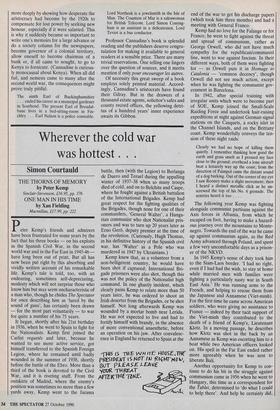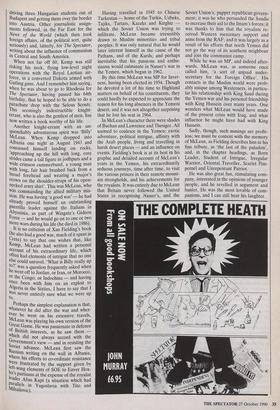Wherever the cold war was hottest . . .
Simon Courtauld
THE THORNS OF MEMORY by Peter Kemp
Sinclair-Stevenson, f16.95, pp. 376
ONE MAN IN HIS TIME by Xan Fielding
Macmillan, £17.99, pp.222
Peter Kemp's friends and admirers have been frustrated for some years by the . fact that his three books — on his exploits in the Spanish Civil War, in the second world war and in the Far East in 1945-46 have long been out of print. But all has now been put right by this absorbing and vividly written account of his remarkable life. Kemp's tale is told, too, with an endearing, sometimes self-depreciating, modesty which will not surprise those who know him but may seem uncharacteristic of a man who, though he chides The Spectator for once describing him as 'lured by the sound of guns', has certainly been drawn — for the most part voluntarily — to war for quite a number of his 75 years.
It began, shortly after his 21st birthday in 1936, when he went to Spain to fight for the Nationalists. Kemp first joined the Carlist requetes and later, because he wanted to see more active service, got himself transferred to the Spanish Foreign Legion, where he remained until badly wounded in the summer of 1938, shortly before the battle of the Ebro. More than a third of the book is devoted to the Civil War, and it is riveting stuff. From the outskirts of Madrid, where the enemy's position was sometimes no more than a few yards away, Kemp went to the Jarama battle, then (with the Legion) to Berlanga de Duero and Teruel during the appalling winter of 1937-38 when so many troops died of cold, and on to Belchite and Caspe, where he fought against a British battalion of the International Brigades. Kemp had great respect for the fighting qualities of the Brigades, though none for one of their commanders, 'General Walter', a Hunga- rian communist who shot Nationalist pris- oners and was to turn up 20 years later as Erno Gerd', deputy premier at the time of the revolution. (Curiously, Hugh Thomas, in his definitive history of the Spanish civil war, has 'Walter' as a Pole who was murdered in 1947 by Ukrainians.) Kemp knew that, as a volunteer from a non-belligerent country, he would have been shot if captured; International Bri- gade prisoners were also shot, though this was not the policy of the Nationalist high command. In one ghastly incident, which clearly pains Kemp to relate more than 50 years later, he was ordered to shoot an Irish deserter from the Brigades, or be shot himself. Not long afterwards Kemp was wounded by a mortar bomb near Lerida. He was not expected to live and had to fortify himself with brandy, in the absence of more conventional anaesthetic, before an operation on his jaw. After convalesc- ence in England he returned to Spain at the end of the war to get his discharge papers (which took him three months) and had a meeting with General Franco.
Kemp had no love for the Falange or for Franco; he went to fight against the threat and spread of communism, rather as George Orwell, who did not have much sympathy for the republican/communist line, went to war against fascism. In their different ways, both of them were fighting for — as Orwell puts it in Homage to Catalonia — 'common decency', though Orwell did not see much action, except when he was fighting the communist gov- ernment in Barcelona.
In 1942, after special training with irregular units which were to become part of SOE, Kemp joined the Small-Scale Raiding Force and undertook hair-raising expeditions at night against German signal stations on the Casquets, a rocky islet in the Channel Islands, and on the Brittany coast. Kemp wonderfully conveys the ten- sion of these night raids:
Clearly we had no hope of killing them quietly. I remember thinking how good the earth and grass smelt as I pressed my face close to the ground; overhead a lone aircraft beat a leisurely way up the coast; from the direction of Paimpol came the distant sound of a dog barking. Out of the corner of my eye I saw Rooney make a slight movement; then I heard a distinct metallic click as he un- screwed the top of his No. 6 grenade. The sentries heard it too . . . .
The following year Kemp was fighting alongside communist partisans against the Axis forces in Albania, from which he escaped on foot, having to make a hazard- ous journey over the mountains to Monte- negro. Towards the end of the war he came up against communism again, as the Red Army advanced through Poland, and spent a few very uncomfortable days as a prison- er of the NKVD.
In 1945 Kemp's sense of duty took him to the Siam-Laos border. 'I had no right, even if I had had the wish, to stay at home while married men with families were fighting a particularly nasty war in South East Asia.' He was running arms to the French, and helping to rescue them from the Japanese and Annamese (Viet-minh). For the first time he came across American soldiers, who were giving no assistance to France — indeed by their tacit support of the Viet-minh they contributed to the death of a friend of Kemp's, Lieutenant Klotz. In a moving passage, he describes how Klotz was shot in the back by an Annamese as Kemp was escorting him to a boat while two American officers looked on. His spell in the Far East ended rather more agreeably when he was sent to liberate Bali.
Another opportunity for Kemp to con- tinue to do his bit in the struggle against communism came in 1956 when he went to Hungary, this time as a correspondent for the Tablet, determined to 'do what I could to help there'. And help he certainly did, driving three Hungarian students out of Budapest and getting them over the border into Austria. Other journalistic assign- ments followed, in the Far East for the News of the World (which then took foreign affairs, of the political sort, quite seriously) and, latterly, for The Spectator, writing about the influence of communism in Central and South America.
When not far off 60, Kemp was still risking his neck, flying low-level night operations with the Royal Laotian air- force, in a converted Dakota armed with Gatling guns. And I remember him saying, when he was about to go to Rhodesia for The Spectator, having passed his 64th birthday, that he hoped to be able to do a parachute drop with the Selous Scouts. This seemingly indestructible knight- errant, who is also the gentlest of men, has now written a book worthy of his life. Another knight-errant with an un- quenchably adventurous spirit was 'Billy' McLean. When Kemp dropped into Albania one night in August 1943 and Concussed himself landing on rocks, approaching up the hill with long, easy strides came a tall figure in jodhpurs and a wide crimson cummerbund, a young man with long, fair hair brushed back from a broad forehead and wearing a major's crown on the shoulder-straps of his open- necked army shirt'. This was McLean, who was commanding the allied military mis- sion. He was having 'a good war' — he had already proved himself an outstanding guerrilla leader against the Italians in Abyssinia, as part of Wingate's Gideon Force — and he would go on to one or two more wars during his life (he died in 1986). It is no criticism of Xan Fielding's book (he also had a good war, much of it spent in Crete) ) to say that one wishes that, like Kemp, McLean had written a personal account of his extraordinary life, which often had elements of intrigue that no one else could unravel. 'What is Billy really up to?' was a question frequently asked when he went off to Jordan, or Iran, or Morocco, or the Congo, or Indochina — and having once been with him on an exploit to Algeria in the Sixties, I have to say that I
was never entirely sure what we were up to.
Perhaps the simplest explanation is that, whatever he did after the war and wher- ever he went on his extensive travels, McLean was playing his own version of the Great Game. He was passionate in defence of British interests, as he saw them which did not always accord with the Government's view — and in resisting the Soviet advance. McLean first saw the Russian writing on the wall in Albania, where his efforts to co-ordinate resistance Were frustrated by the support given by left-wing elements of SOE to Enver Hox- ha's partisans at the expense of the royalist leader Abas Kupi (a situation which had parallels in Yugoslavia with Tito and Mihailovic).
Having travelled in 1945 to Chinese Turkestan — home of the Turkis, Uzbeks, Tajiks, Tartars, Kazaks and Kirghiz which the Soviet Union was trying to infiltrate, McLean became irresistibly drawn to Muslim minorities and tribal peoples. It was only natural that he would later interest himself in the cause of the Pathans, and of the Kurds; and perhaps inevitable that his passions and enthu- siasms would culminate in Nasser's war in the Yemen, which began in 1962.
By this time McLean was MP for Inver- ness, having been elected in 1954. Though he devoted a lot of his time to Highland matters on behalf of his constituents, they could hardly be expected to appreciate the reason for his long absences in the Yemeni desert, and it was not altogether surprising that he lost his seat in 1964.
In McLean's character there were shades of Buchan and Lawrence and Thesiger. All seemed to coalesce in the Yemen: exotic adventure, political intrigue, affinity with the Arab people, living and travelling in harsh desert places — and an influence on events. Fielding's book is at its best in his graphic and detailed account of McLean's years in the Yemen, his extraordinarily arduous journeys, time after time, to visit the various princes in their remote mount- ain strongholds, and his achievements for the royalists. It was entirely due to McLean that Britain never followed the United States in recognising Nasser's, and the Soviet Union's, puppet republican govern- ment; it was he who persuaded the Saudis to increase their aid to the Imam's forces; it was thanks to him that the royalists re- ceived Western mercenary support and arms from the RAF; and it was largely as a result of his efforts that north Yemen did not go the way of its southern neighbour and join the communist camp.
While he was an MP, and indeed after- wards, McLean was, as someone once called him, 'a sort of unpaid under- secretary for the Foreign Office'. His contacts in the Muslim world were prob- ably unique among Westerners, in particu- lar his relationship with King Saud during the Yemen war and his personal friendship with King Hussein over many years. One wonders what McLean would have made of the present crisis with Iraq, and what influence he might have had with King Hussein.
Sadly, though, such musings are profit- less; we must be content with the memory of McLean, as Fielding describes him in his fine tribute, as 'the last of the paladins', and, in the chapter headings, as Born Leader, Student of Intrigue, Irregular Warrior, Oriental Traveller, Scarlet Pim- pernel and Unrepentant Patriot.
He was also great fun, stimulating com- pany, interested in the opinions of younger 'people, and he revelled in argument and banter. He was the most lovable of com- panions, and I can still hear his laughter.



































































 Previous page
Previous page